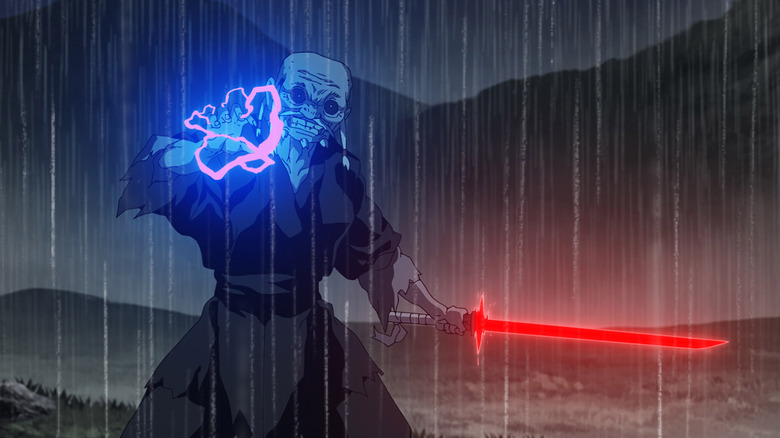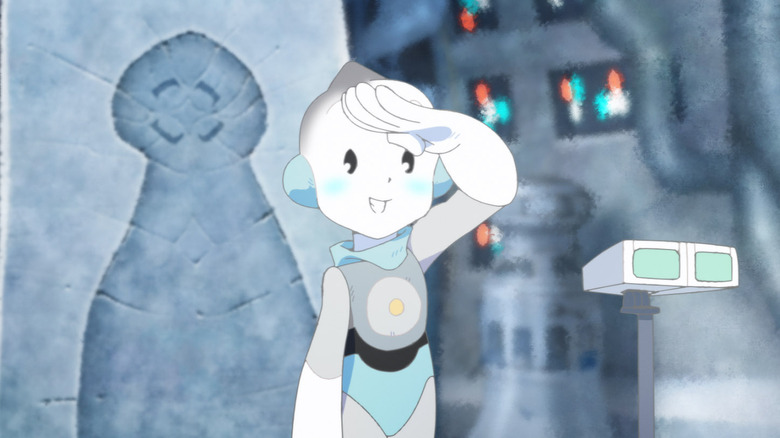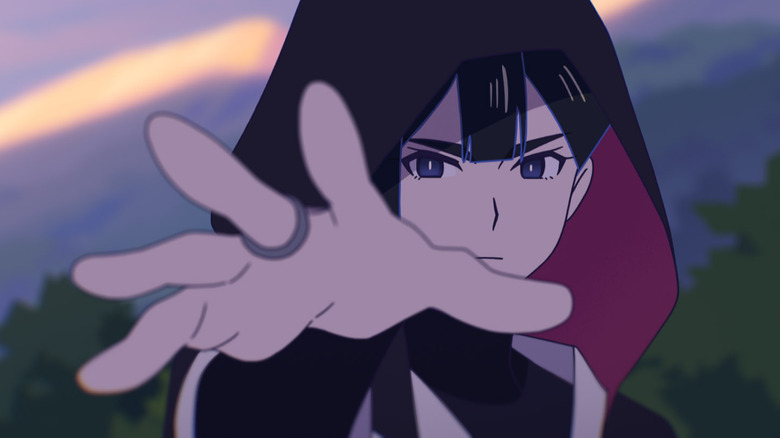How Star Wars: Visions Embraces And Reinvents The Franchise's Long-Held Values [Interview]

When "Star Wars: A New Hope" released in 1977, audiences were blown away by the original adventure tale. And it is original, in as much as any story idea is. But the American space opera has always had the cinema of Akira Kurosawa coursing through its veins. In crafting his epic, George Lucas leaned heavily on Kurosawa's 1958 samurai picture "The Hidden Fortress," down to mimicked lensing and particular shots. Now, decades, several sequels, three prequels, and a ton of spinoffs and merchandising later, Lucasfilm has joined forces with overseas animation studios to expand the galaxy far, far away, utilizing that very influence to enrich a saga beloved worldwide.
"Star Wars: Visions" is an anthology series coming to Disney Plus on September 22. It consists of nine short anime episodes, each helmed by a different director and Japanese animation studio, including Kamikaze Douga, Twin Engine, Trigger, Kinema Citrus, Production I.G., and Science SARU. While they are set in the "Star Wars" realm (and sometimes set between specific films), you don't have to be a hardcore fan of either Star Wars or anime to keep up. Initial buzz has been strong for "Star Wars: Visions," including my own review here at /Film, where I call it "more of a return to roots than a regurgitation."
I recently sat down with "Star Wars: Visions" executive producer James Waugh and producer Kanako Shirasaki and chatted about the hurdles and motivations of expanding and celebrating a long-running franchise.
"We Didn't Want To Be A Studio That Was Going To Go And Say, 'We're Just Here For Your Aesthetic.'"

We see Westerners taking on Asian properties all the time, but, it's more rare to see the opposite happen. And with these talented creators at these Japanese studios, putting their spin on Star Wars, at what point did you believe, "Okay, this can be done and done well," or did you have to be convinced at all?
James Waugh: No, quite the opposite. We were fans of a lot of these studios for a long time. Just in general, I think it really influenced our sort of internal reference points when we're talking about movies or talking about animation and the things that have inspired us over the years. There's sort of this common lexicon of anime and Lucas Film. So, we know what's possible there and we know the amazing art done. I think it wasn't so much a convincing; it was more, "What's the best way to approach this that's going to keep it authentic and allow these creators to do what they do best?" We didn't want to be a studio that was going to go and say, "We're just here for your aesthetic." We wanted a specific voice because they showcase kind of breadth of what type of storytelling is being done in anime. And that was really our hope from the start. So, I don't think any of us doubted could, would this work; I think it was what was the right framework that could facilitate it.
You can see it in the array of styles and tones that you guys have here. What is the throughline that you guys had when you were bringing these stories together? Was there something that specific that you were looking for in each story or with each director?
Waugh: I think I would say we first crafted the "Visions" framework as a way to build something that will be more celebratory, will allow people to really kind of have a degree of artistic expression without the conversation being around, "What point of the timeline does this take place in?" It's all been great. We will solve that problem, but it was very broad. I mean, the framework, and Kanako can speak to this as well, I think the briefs that something along the lines of what elements of "Star Wars" inspired you, feel free to pull from 40 years of history or anything that excites you. We want you to be inventive. We want you to render your own characters. We didn't want this to be a "Star Wars" old show where we would take a known character and do a story that was sort of a subverted version of who those characters are.
I think that's super normal, it just wasn't the intention and then, yeah, that was about it. And we wanted to make sure these stories at heart and really kind of "Star Wars" values. It was pretty broad.
Kanako Shirasaki: Yeah, but each creator, after we started talking to them, we realized every single one is a huge "Star Wars" fan. At certain times of their lifetime, "Star Wars" influences them heavily. So, you feel the love from the creators, every single shot they created. Not only the directors and the writers, it's all the animators working behind the shorts, they really do their best because they can finally make "Star Wars" by themselves. They're so passionate about this project, from all around the world.
"Embrace Your Nerdiness."

We live in an age when filmmakers who grew up on narrative video games and evolving iterations of anime are now telling their own stories and infusing that experience into their stories. And it sounds like, if I'm correct here, you encourage the storytellers at every level to draw upon that media they grew up with.
Waugh:
Absolutely.
It's okay to be nerdy.
Waugh: [Laughter] I know, embrace your nerdiness. But the truth is there is such a tradition of storytellers influencing future storytellers, and current storytellers really being inspired by what's come before and finding new ways to reinterpret those ideas. Every great movie ever, every great story ever, you're a product of your influences. And so, seeing "Star Wars" be such an influence to these studios and then seeing Kurosawa and anime being such an influence to George, it's an interesting kind of passing back of ideas and then reinterpreting it again.
One of the things I really dig about this series is something you touched upon earlier, James, that you don't have to have been steeped in the Star Wars lore and the sacred texts to follow along and engage with these stories, which are universal. You've got good versus evil, you've got broken family bonds, was that a target within your sights during the concept phases? That kind of accessibility for newer fans of the franchise?
Waugh: It was, absolutely. Again, I don't know if we went out of our way to say these all have to be easily onboarding. What we did say is we want new stories that you didn't need to know prior context. We wanted them to use the elements of the galaxy, just to tell great stories that were human stories, that were character stories that really leveraged the power of the galaxy. I think the byproduct of that is they're accessible because they're really mythic stories about characters in really unique situations. I think it's because they're new and because they're not leveraging the weight of the timeline that so easy to just grasp.
What's the biggest hurdle in handling an expansive universe like this across studios and platforms and media?
Waugh: I think it's a matter of balance. The trick to it and the art to it, I guess, is it comes down to making sure that you're getting the best creatively from different creators, with different points of view and allowing them to express their points of view in a way that still fits into a larger tapestry and to be mindful the other threads that are kind of weaving it all together. There's a challenge at times with that, but it's also part of the power of "Star Wars." I think what "Visions" has done is it's allowed us to celebrate "Star Wars" and tell "Star Wars" stories that weren't necessarily part of that cohesion. Some of them can be, there's a couple of these stories that fit very well within canon and within the timeline, but that wasn't the impetus of this.
Shirasaki: Yeah, the other thing would be the creators from different cultural backgrounds from the Western storytelling standpoint, although one director is from Spain. There's just some context that easy to get lost in translation, or whether you need slightly more discussion to understand the true meaning behind the direction that director or the studio wants to going forward. But I think it's a mutual feeling, the studios in Japan and Lucas Film have been very open-minded to explore this visionary platform and the framework that we are trying to explore. I think it works pretty well.
"Star Wars: Visions" arrives on Disney Plus on September 22, 2021.
Read this next: Star Wars: Visions Review: A Refreshing And Gorgeous Spin On A Galaxy Far, Far Away
The post How Star Wars: Visions Embraces and Reinvents the Franchise's Long-Held Values [Interview] appeared first on /Film.
from /Film https://ift.tt/2XDdqJD
No comments: